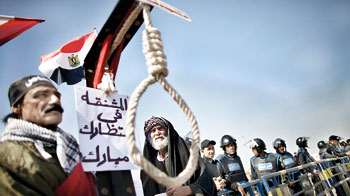CAIRO, (Reuters) - Mohamed Moustafa Morsy had to sneak out of his home to join the protests against Hosni Mubarak last year, afraid his parents would stop him if they knew where he was going.
Hours later, the 22-year-old was dead, shot on his way to Tahrir Square.
Morsy's father is one of the few family members allowed into the courtroom where Mubarak is now on trial, charged with ordering the shooting of protesters, about 850 of whom died in the uprising.
At first optimistic that Egypt's "trial of the century" would bring justice, he gradually lost faith in the proceedings after hearing one officer after another testify there were no orders to shoot.
 |
| Egyptian anti-Hosni Mubarak demonstrators pose in front of a mock gallows whilst riot policeman provide security outside the court in Cairo on Wednesday. AFP |
"I did not bury my boy to watch these dogs get away," he told Reuters during one September session, before he stopped attending.
When the 83-year-old Mubarak first appeared in court, many plaintiffs and observers who never imagined he would be held to account said Egypt had regained its dignity. But for many the trial that should have helped close the wounds of the past has instead come to symbolise all that hasn't changed.
Many Egyptians are also bothered by the fact that in the rush to bring Mubarak to justice, the trial is being conducted by the very institutions -- the ministries, police and courts, as well as the laws they administer -- used to prop up his autocratic 30-year rule.
Egypt has not pursued a truth and reconciliation body such as the commission in South Africa that helped bridge divisions after apartheid, nor, in the eyes of many Egyptians, has it been able to hold former officials to account in a transparent way through courts with special mandates, as in Latin American countries like Argentina. As if to drive the point home, in the hall leading to the courtroom, formerly a lecture hall in the Police Academy where some of the defendants either studied or taught, a picture that includes one of the officers standing trial still hangs on the wall. The academy itself was until a few months ago named after Mubarak. "We are in this situation because you cannot change the laws overnight," said Hassan Abou El Einein, a lawyer for one of the 400-plus plaintiffs. "After the revolution, the revolutionaries should have issued a decision to establish revolutionary courts."
Public anger has focused on the prosecutor, who was appointed by Mubarak and whose office has not been reformed since the president was ousted. In its defence, the prosecution has blamed the Interior Ministry -- an institution which is both the accused and the investigator in this case -- for not cooperating in handing over evidence.
"Mubarak is being tried by laws he put in place," said Maha Youssef, the head of the legal affairs department at al-Nadim Center for Victims of Violence. "The judge is restricted by legal regulations and the evidence."
CONCLUSIVE EVIDENCE
That evidence is proving weaker than many had hoped.
More than 1,600 people gave testimonies to the prosecution before the trial, from doctors who signed autopsies to government officials to victims of the violence. The court invited nine people for public cross-examination, all but one of them police officers.
None of those called could provide conclusive evidence that there were orders to fire at protesters, lawyers on both sides of the court room and experts say.
Former interior minister Habib al-Adli and six other senior police officers are on trial with Mubarak, all of them charged with ordering the killing of the protesters.
Also on trial are Mubarak's two sons on a handful of corruption charges involving abuses of power. But many Egyptians had wanted the trial to address the wider injustices of Mubarak's rule.
The judge was hearing final arguments from the defendants and their lawyers on Wednesday, but the verdict is not expected until the latter part of March, at the earliest. Prosecutors are seeking the death sentence for Mubarak.
Early in the proceedings, one of the witnesses, General Hussein Saeed Moussa, told the court that he had been sentenced by another court for destroying recordings from the police force's operation room during the 18-day uprising. Critics say this showed how months of foot-dragging may have helped damage essential evidence.
A deputy interior minister, Hassan Abdel Hamid Farag, who attended a meeting with minister Adli and the other top officers during the uprising, initially indicated his colleagues had made a decision to confront peaceful protesters with violence and called it a "mistake".
"The decision of the meeting was to prevent the protesters from entering Tahrir Square even if by use of force," he told the court in September.
But in his cross-examination, he denied that a decision to specifically allow the use of firearms was ever made.
"There is not a single shred of evidence showing orders for an officer or a soldier to open fire on protesters," Adli's defence lawyer Essam el-Batawy told Reuters. |


